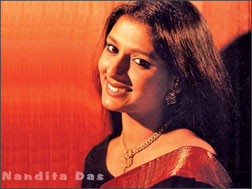GleaningsExtreme
Nationalism identifies people with labels
K S Sivakumaran
One other Indian film that exposed the stupidity of identifying
people with labels and violating the human rights on account of the
people’s racial or religious identity was Firraq a film directed by the
versatile actress, primarily of the Bengali screen but gained prominence
in Hindi films to - Nandita Das.
This was shown last month at the Kerala International Film Festival.
Four languages - (Hindi, Urdu, Gujarati and English) - are spoken in
this engrossing film. As her maiden film, Nandita Das emerges as a
sensitive film director too. The film is called Firaaq.
|

Nandita Das |
We learn that the Urdu word Firaaq means both separation and quest.
The screenplay is cleverly constructed by Shuchi Kothari and Nandita Das.
Ravi K. Chandran’s cinematography speaks volumes of how the humankind is
manipulated and driven to passion and destruction.
In the name of race, religion and class peace and harmoniously living
people are taken to task because of the basic animal instinct to destroy
the other. While the larger section of the humanity lives with hope and
optimism to lead a peaceful life, a tiny fraction of fundamentalists
would like to dictate their own ideology of exterminating the other. All
this happens even after enlightenment and global understanding.
The aim of the filmmaker seems to be that “separation in the minds
and hearts go beyond the physical.” And that the “quest for peace and
understanding is our only hope”. The film succeeds to a greater extent
through the characterisation and portrayal of the actualities.
The events in the film take place within a day. On this particular
day a feeling of unpredictability pervades the mind and feelings of a
few individuals who had been affected by the horrific communal carnage
that took place in Northern India.
Inter-marriages are good and welcome, but the racists invariably
target such couples due to their hatred towards one community or the
other. In this film a young Hindu woman is married to a young Muslim.
Although they love each other transcending their race consciousness,
yet they are bound to have suspicions about each other. To avoid trouble
they hide their identity and at the same time they desire to assert it.
In fact at the end of the film the Muslim asserts his identity.
While T. V. Chanran’s Malayalam film spotlighted the atrocities of
the a few Muslims, Nandita Das’ film shows how the Hindus were violent
in their racial and religious stance.
In another parallel level the loyalties of two best friends are
tested in the times of fear and suspicion.
A third incident is when a group of young men having suffered the
riots, “seek revenge to fight their helplessness and anger”.
A middle class housewife struggles to overcome her gilt. She had
earlier closed her door on a victim and struggles to calm herself.
Artistic film makers stimulate the viewers to think critically of
issues. This film made me think and feel for the unfortunates.
[email protected] |



